
Rocky Mountain coal mine in Alberta takes next step to expansion
In Alberta, a massive open-pit coal mine near Jasper National Park is hoping to expand...
At the end of a dirt road about an hour’s drive north of Edmonton, the hum of machinery pierced the air as a pumpjack nodded up and down, striking a black silhouette against the bright sky.
Normally, one would expect the pumpjack to be sitting alone on the Alberta prairie, surrounded only by a few pieces of equipment.
But at this site a gas generator buzzed loudly and power lines snaked their way to another structure filled with rows and rows of computers, arranged on metal shelves and connected with winding, multicoloured cables. A sign nearby listed the operator: MAGA Energy, a privately owned Calgary oil and gas company.
This small operation near Westlock, Alta., is a natural gas well being used for a novel purpose: to generate Bitcoin, the world’s leading cryptocurrency. The Narwhal visited the site in August.
Bitcoin is a form of digital money that can be “mined,” or produced by users who deploy energy-hungry computers to churn through cryptographic puzzles. Some cryptocurrencies like Bitcoin are quite valuable in Canadian dollars, but they can also be volatile, high-risk investments prone to scams.
MAGA Energy — short for “Make Alberta Great Again,” a play on its more well-known use as Donald Trump’s slogan “Make America Great Again” — is hoping to capitalize on a more constant trend: the need Bitcoin miners have for cheap, plentiful sources of energy to power their computers. By offering their natural gas assets to Bitcoin miners, MAGA Energy intends to breathe new life into about 60 of its gas wells in Sturgeon County, in the Edmonton region, that were previously “shut in,” or closed off from production.
According to the company, these wells were shuttered after a nearby power plant — a consumer of the gas produced at the wells — closed in 2014. Now MAGA Energy is among several oil and gas companies across the country hoping Bitcoin can provide a way to sell its products a different way: by burning it on the spot.
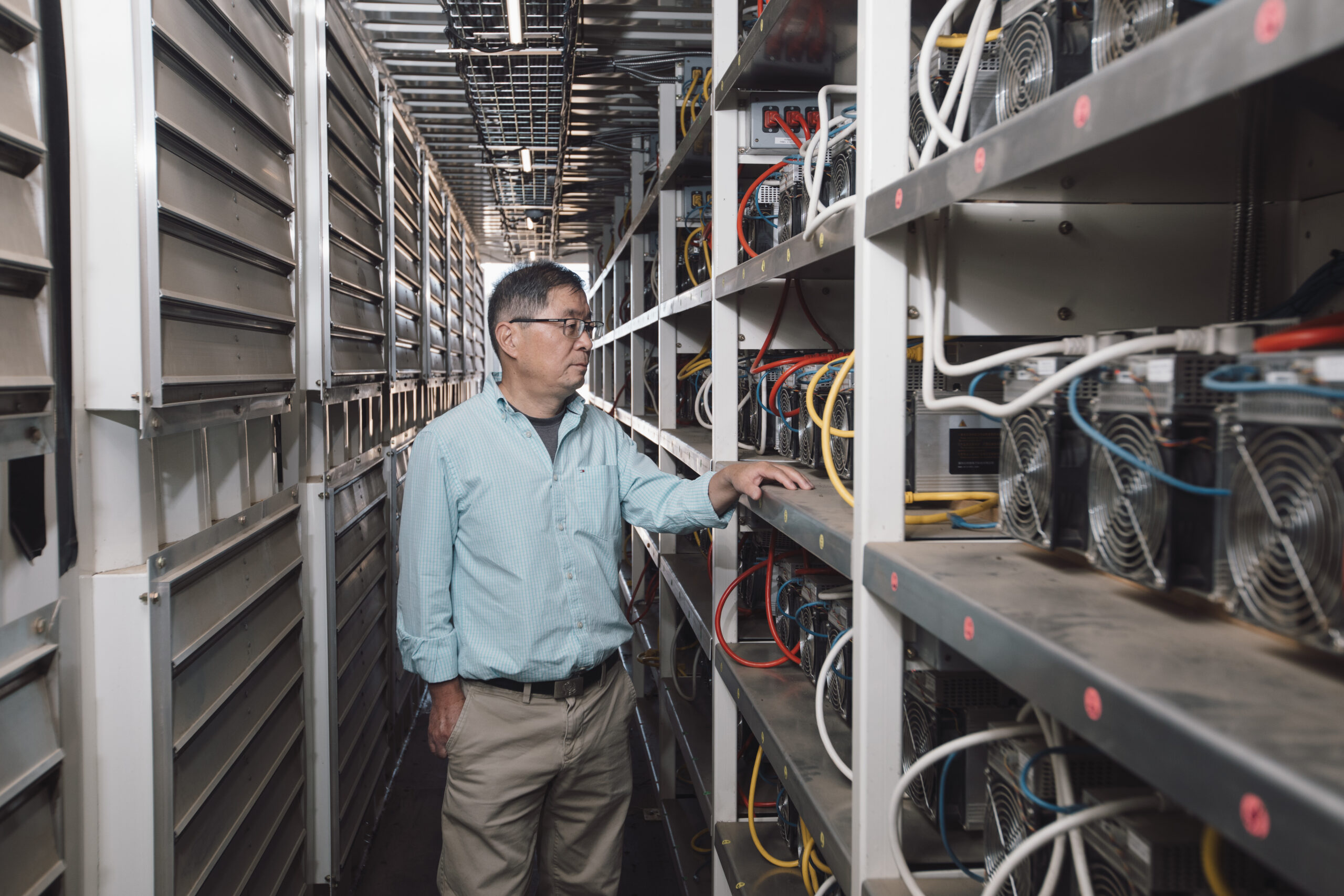
For proponents, burning natural gas to power Bitcoin mines is a useful way for companies with stranded oil and gas assets to sell more energy. Advocates also argue if Bitcoin miners can run their computer rigs from escaped methane from oil and gas drilling, it is less damaging to the climate than letting the methane gas escape directly into the atmosphere.
But like other fossil fuel projects, it creates carbon pollution and furthers climate change. A report from Sturgeon County’s administration to local council members makes it clear that MAGA Energy’s proposal would “increase emissions.” It specifically noted this was inconsistent with the county’s guiding principle of “environmental stewardship.”
Powering crypto mining with individual fossil fuel sites would at best be an emissions-neutral undertaking, far from the “urgent system-wide transformation” scientists have shown society needs to undergo in order to avoid more extreme climate consequences.
Critics argue by giving new life to old facilities, these kinds of fossil-to-Bitcoin schemes are threatening to prop up a dying fossil fuel industry and put emissions-reduction targets in jeopardy.
This pattern can be seen in places like Montana, New York and Pennsylvania, where companies have reversed plans to close coal-fired power plants, or restarted plants that had already closed, to power Bitcoin mines.
In September, the White House Office of Science and Technology Policy issued a report concluding U.S. climate objectives would be under threat unless the U.S. government developed environmental performance standards for cryptocurrencies to minimize carbon pollution.
“Crypto-asset mining produces greenhouse gas emissions and exacerbates climate change primarily by burning coal, natural gas or other fossil fuels to generate electricity,” the report said.
“The electricity generated at power plants to power crypto-asset mining and for all uses of electricity can damage the environment and human health.”
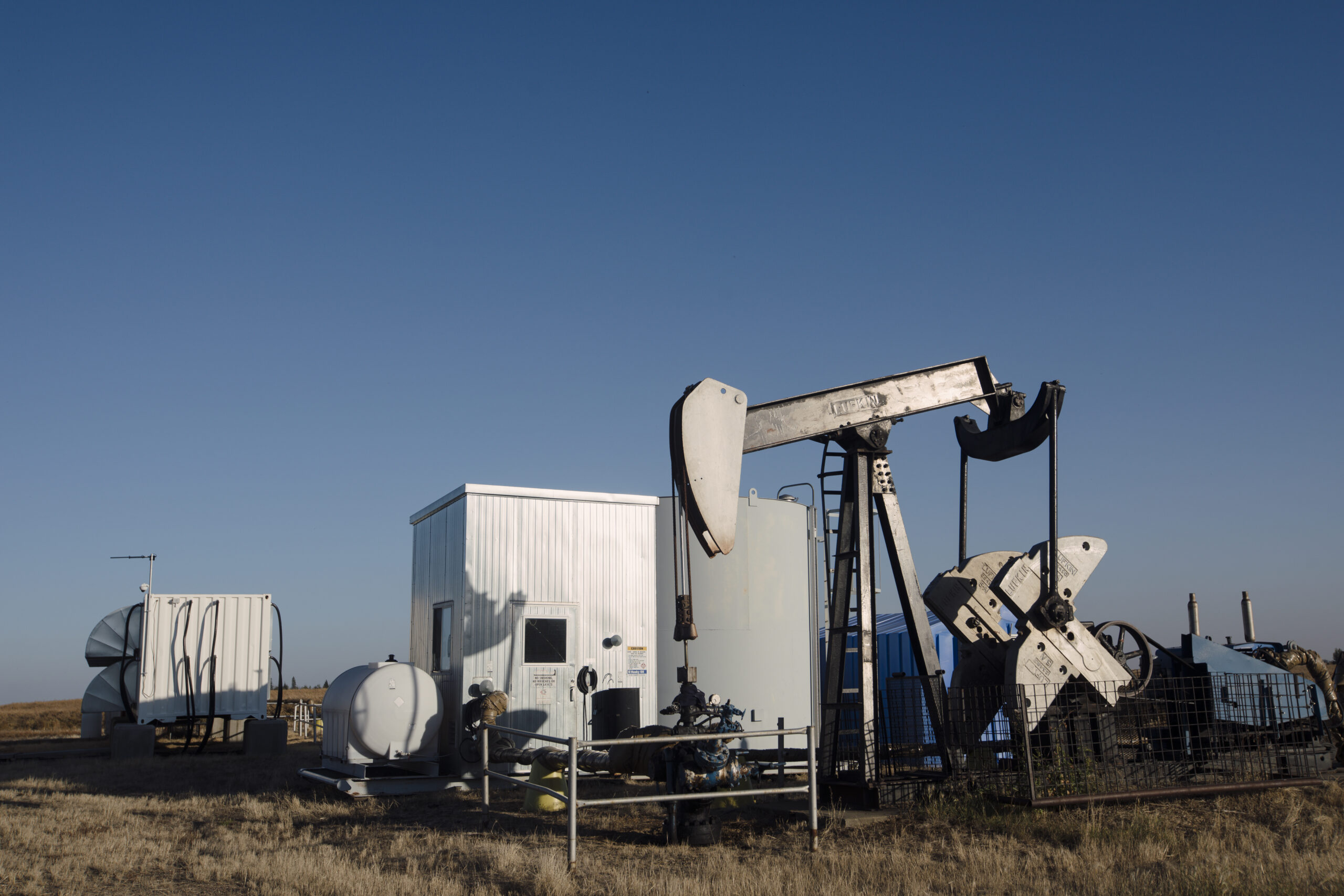
MAGA Energy is not the only company in Alberta pursuing this line of business.
In April 2022, the provincial energy regulator issued a bulletin saying it was “aware of cryptocurrency mining operations running alongside” oil and gas facilities in the province.
“We are looking to better understand the situation and work with regulated parties to manage potential risks and ensure compliance and overall safety,” the regulator wrote.
An official at the province’s utilities commission also confirmed to The Narwhal there has been “an increase in cryptocurrency mining operations entering Alberta” and the commission had developed its own bulletin about small power plants, released in March, in part as a result of this activity.
Koleya Karringten, executive director of the Canadian Blockchain Consortium, a crypto industry group, said there were “large oil and gas companies currently in the province of Alberta that are looking to diversify their assets by adding generators to their sites, and being able to mine” cryptocurrencies.
“There’s a lot of ways [crypto] mining companies can partner with energy companies,” she said.
The industry is lobbying against a proposal to eliminate an existing federal tax break for crypto miners. The legislation to implement this measure has not yet been tabled in Parliament.
These changes would mean “it would be extremely expensive for mining companies to be able to operate in the country,” Karringten said. “So we are hoping that the government sees the value this industry can create, especially supporting our natural resources sector.”
She added crypto miners were dealing with “a lack of clear regulatory guidelines” across the country, and were looking for a national securities framework to allow mining companies to operate with full licenses.
The federal government’s fall economic statement acknowledged Canada’s financial system regulations need to “keep pace” with the transformative impact of crypto and digital money. The government said it is launching consultations on cryptocurrencies in November 2022.
“At the same time, the digitalization of money poses a challenge to democratic institutions around the world. In the last several months, digital assets and cryptocurrencies have been used to avoid global sanctions and fund illegal activities, both in Canada and around the world,” the statement read.
Conservative Party of Canada leader Pierre Poilievre was initially an outspoken advocate of allowing Bitcoin and other cryptocurrencies to “thrive” in Canada, as an “alternative” to the dollar. He vowed to implement legislation, for example, to treat some crypto assets like regular stocks and bonds if Conservatives win the next election. He talked about “the freedom for buyers and sellers to choose Bitcoin” and promoted himself buying a shawarma using the digital currency.
Poilievre has not actively promoted Bitcoin since its value crashed in the second quarter of 2022. Since the crash, a number of companies have been driven into bankruptcy. This fall, Prime Minister Justin Trudeau criticized Poilievre over his past support for Bitcoin.
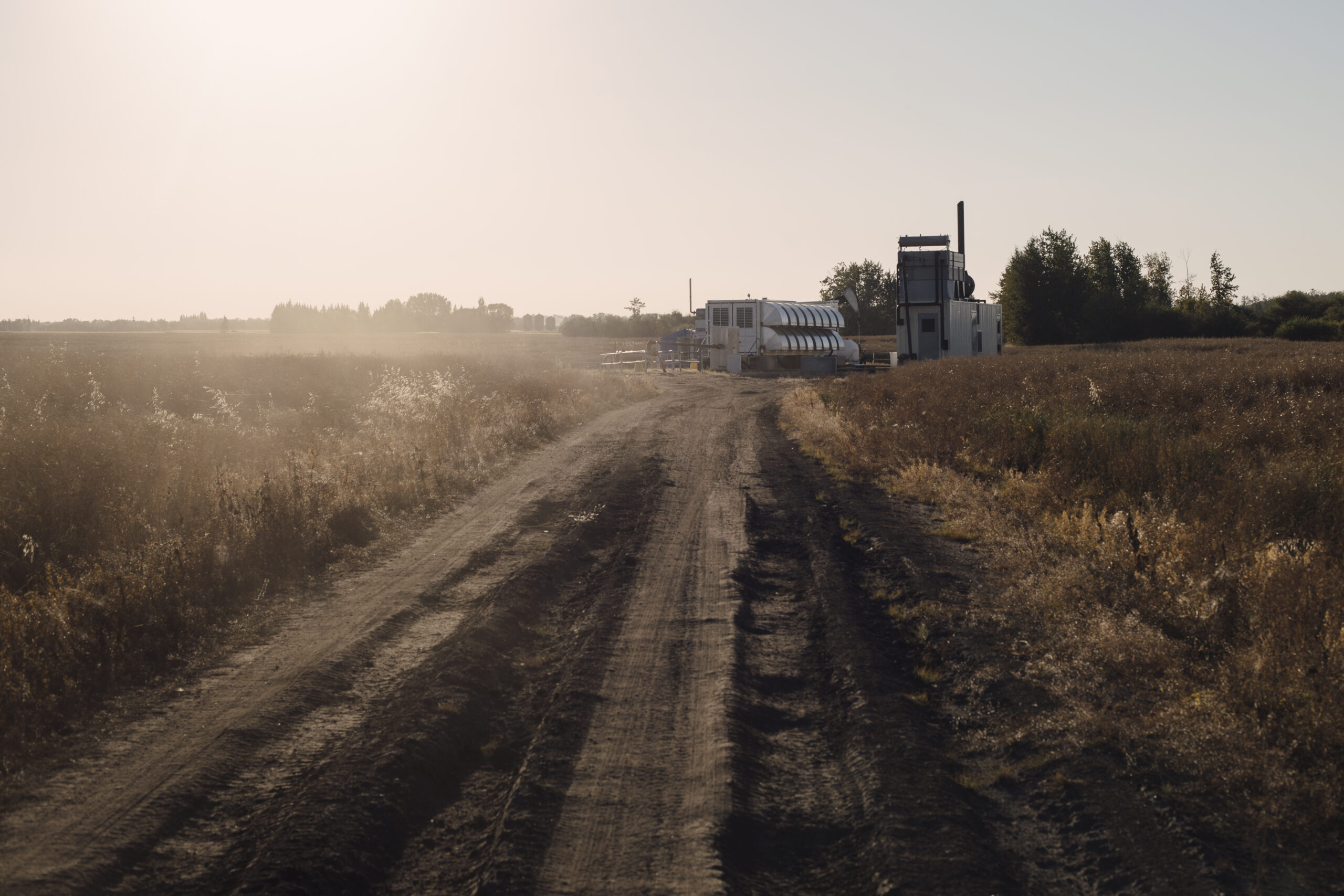
Karringten estimated there were about 40 crypto mining companies in Alberta, and virtually all of them were running off natural gas. Fossil fuels produce almost 90 per cent of electricity in Alberta.
Large companies like Exxon Mobil are also interested in crypto mining. The largest U.S. oil and gas company has been running a pilot project to burn natural gas from North Dakota oil wells to run crypto mining operations.
Exxon Mobil is the majority owner of Imperial Oil, one of the largest fossil fuel companies in Canada. The company’s annual report does not mention crypto mining. A spokesperson for the company did not respond to questions from The Narwhal.
There are several Bitcoin mining companies across the country, some of which are publicly traded. Many of these companies are powered by the grid, not individual oil and gas facilities.
The country’s “hash rate,” an industry estimate for how much computing firepower is being aimed at the Bitcoin network, has increased by over 1,200 per cent in less than three years, according to an index published by the University of Cambridge.
But those numbers are just a broad estimate and don’t break down the industry by energy type. Exactly what kind of fossil fuel-powered Bitcoin mining is happening in Canada, or how much carbon pollution the activity is generating, is unclear.
Henry M. Kim, an associate professor at York University and the director of the blockchain lab at the Schulich School of Business, has been studying the carbon footprint of cryptocurrency mining and also has found there is a lack of data.
Kim and Andrea Podhorsky, an assistant professor of economics at York University, published a paper in October concluding “since the carbon intensity of electricity generation varies widely from region to region and the Bitcoin network design largely conceals the miners’ locations, it is difficult to precisely estimate the [carbon dioxide] emissions from mining at a regional level.”
“The bottom line is, people don’t know. … It’s actually not that easy to measure,” Kim said.
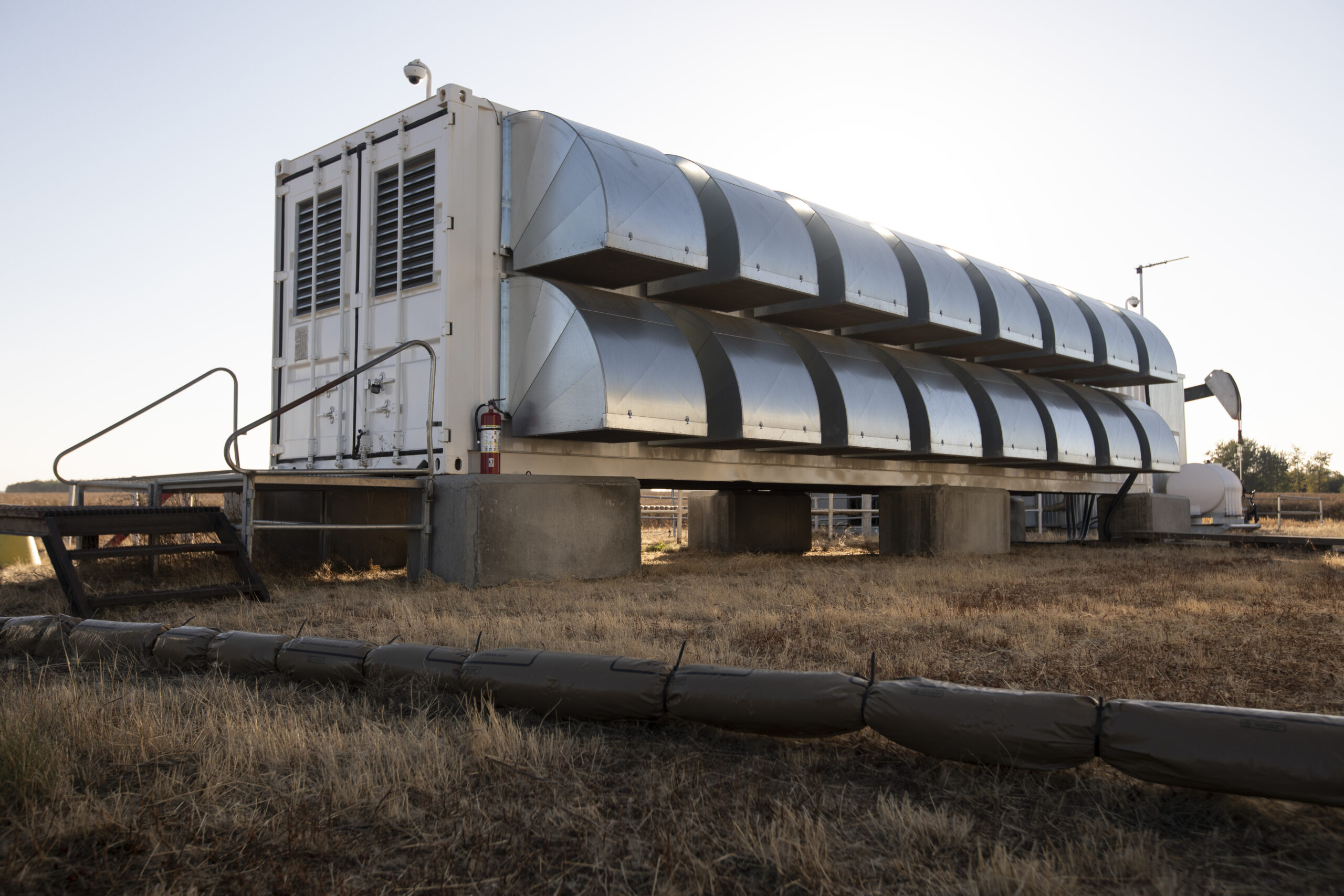
Neither Alberta’s energy regulator nor its utilities commission could give any specifics about how many crypto mining operations there were in the province, or what kind of emissions they were responsible for.
The regulator said it was still working to verify the information it had received from its public outreach. The commission said it didn’t track how many power plants were dedicated to crypto mining, because applicants aren’t required to say what purpose the power is to be used for.
The provincial energy ministry refused a freedom of information request from The Narwhal for access to records concerning the use of oil and gas sites to power cryptocurrency mining operations, stating it included “advice from officials,” and other information that could be “harmful to economic and other interests of a public body.”
Freedom of information legislation in Alberta requires provincial ministries and other public organizations to provide access to information, upon request to anyone who pays a $25 fee, unless they have a valid reason to refuse.
Alberta Municipalities, an organization representing cities in the province, said in an October 2021 brief that cities “may need to balance their role in the regulation of climate change matters with the approval of cryptocurrency mines which require significant power.”
The organization told The Narwhal it was not tracking the issue. Another group, Rural Municipalities of Alberta, an association made up of rural municipal districts and that counts Sturgeon County as a member, also said it didn’t have any data to share on the topic.
The picture is similar outside the province. Utilities and regulators across Canada were hesitant to share statistics on the industry when asked by The Narwhal, either because the information isn’t being collected or because of privacy concerns.
“In order to protect the privacy of our customers, we do not publicly disclose the types of businesses connected to our system,” a spokesperson for Hydro One, one of the largest utilities in Ontario, said in an email.
Similarly, a spokesperson for Manitoba Hydro confirmed it did have “a number of cryptocurrency operations in Manitoba,” but said it couldn’t divulge “the number of operations or their load due to confidentiality reasons.”
BC Hydro estimated it was supplying on average about 80 megawatts of electricity load to crypto mining activity. But it said since customers weren’t required to disclose the nature of their business, the utility couldn’t determine how many cryptocurrency operators that number represented.
“There is still a significant amount of uncertainty as to how this industry will develop over time,” a spokesperson for the utility said in an email.
The B.C. Oil and Gas Commission said it was “not aware of any crypto mining operations on or near any of our regulated assets.”
Hydro-Québec said at the end of June it had 103 clients involved in crypto mining on their grid, and they had consumed 75 gigawatt-hours in that month. But the utility said that because its electricity was almost 100 per cent non-emitting, “there is no greenhouse gas emissions associated.” Quebec’s electricity is 94 per cent hydropower.
In early 2021, Canada’s national energy regulator singled out the “energy demands associated with cryptocurrency mining” as an example of how a new and significant power drain could affect climate goals. That regulator had also not done any recent analysis of crypto mining, a spokesperson told The Narwhal.
The Canada Revenue Agency, which has produced several guides on keeping records of crypto transactions, said it has “established a dedicated crypto-asset unit to build intelligence.” But, it added, it “does not currently track crypto-asset declarations separately in our system.”
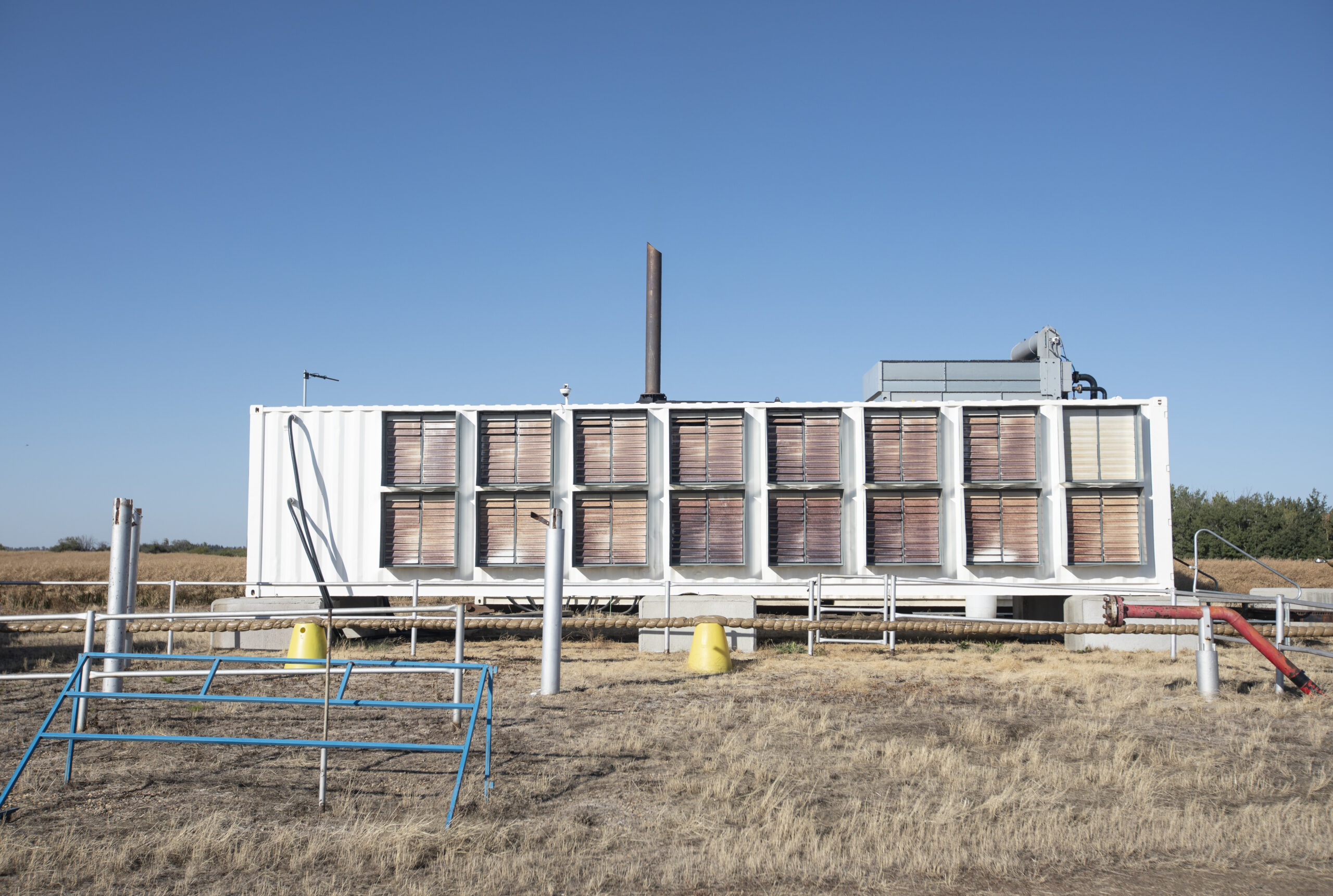
MAGA Energy insists its plan is greener than it sounds.
In response to questions from The Narwhal about the climate impact of their operations, company board chair David Tian said the firm’s plan is to eventually bundle their sites with emissions-lowering technologies, like carbon capture.
In an interview, he also talked about a plan to erect greenhouses nearby to their gas wells — greenhouses he said could use the excess carbon dioxide from burning gas and waste heat from running Bitcoin computers, to grow vegetables.
“Because this is waste heat, and also [carbon dioxide], we’re not going to charge much for those [greenhouses] — we can give them a very low price, and let the greenhouse operators have reasonable returns,” he said.
That infrastructure had not yet been built when The Narwhal visited.
It’s unclear what kind of ability the company has to invest in these emissions-lowering projects. MAGA Energy has 20 employees and 95 operating wells, producing about 1,800 barrels of oil equivalent per day of oil, gas and natural gas liquids. For perspective, large oilsands companies produce many hundreds of thousands of barrels per day.
Tian declined to share business statistics with The Narwhal such as general revenues or costs, whether it was making a profit right now or whether it was backed by any significant investors.
“We are a private company and we don’t disclose these financial results publicly,” he said. “However what I can disclose is that currently MAGA is a financially healthy company after two years of a very tough time during COVID-19, and it is on the way to getting better.”
Bitcoin’s volatility in the markets will also affect how profitable MAGA Energy’s plans can be. Tian said there is now less demand from Bitcoin miners than when they pitched Sturgeon County administrators on their plan to use their shut-in gas wells. But he said MAGA Energy still hopes to attract miners “at a gas price lower than market price.”
Even if the price of Bitcoin rises again in future, the company’s plans to add carbon-capture equipment will still face a big technical challenge. Most major projects, for example, have failed to stop the emissions they promised to capture. The technology is also still unproven at the scale necessary for broad decarbonization of the energy sector.
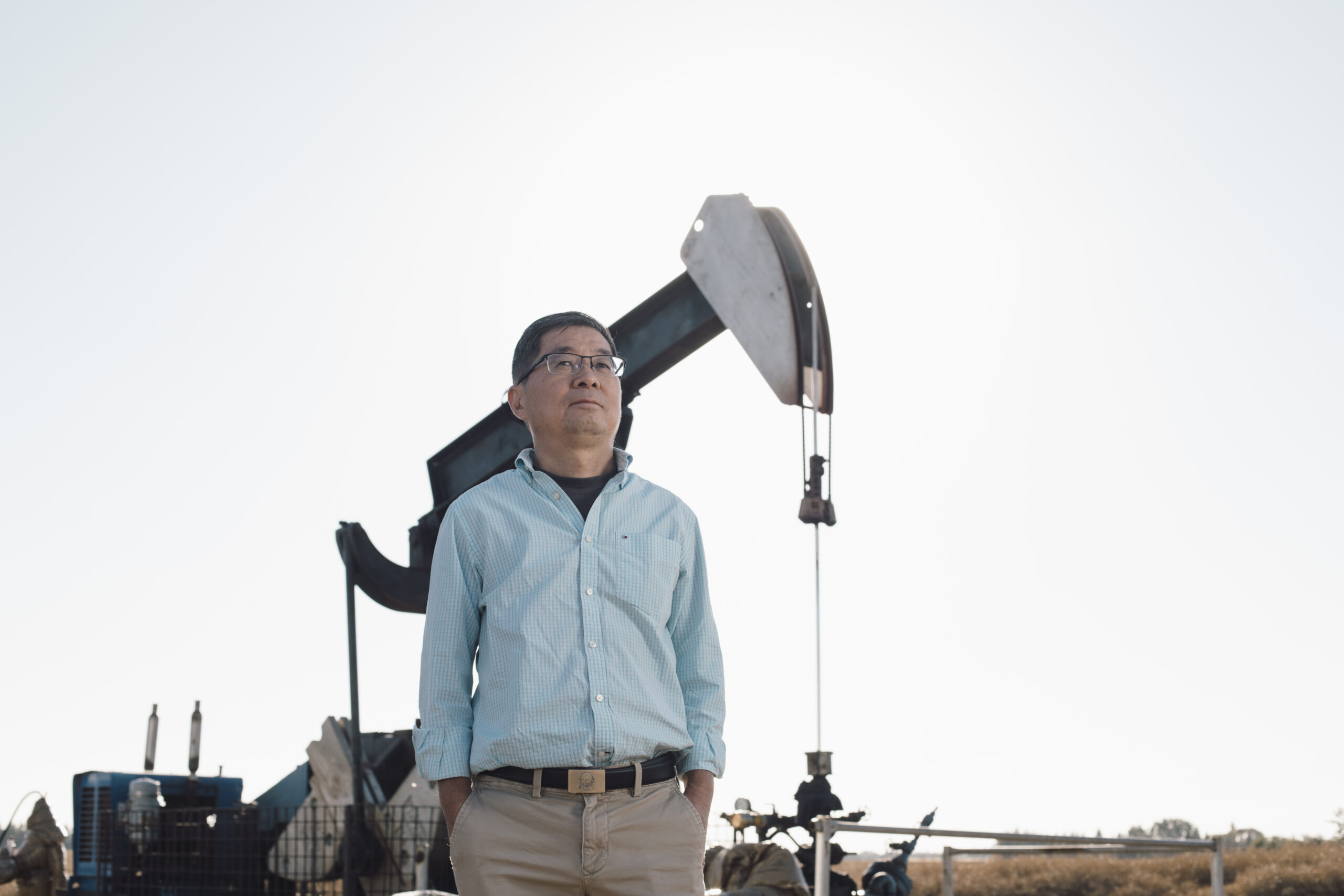
In addition to emissions, crypto mining can also cause other environmental impacts, according to the White House report. It flagged local noise and water impacts, air quality and environmental justice concerns as other potential issues.
MAGA Energy is familiar with noise complaints. A previous partnership with another firm using one of its gas wells to mine for Bitcoin led to nearby residents complaining about the mine’s noise levels, comparing it to “several idling Boeing 737s.” The operation was shut down.
In November 2021, the company gave a presentation to Sturgeon County administrators about changing the land-use bylaw to allow these kinds of facilities. Council approved, and voted in favour of adding “data processing facility” as a legitimate operation.
As part of its presentation, the company promised to follow all regulatory requirements “strictly,” such as noise and environmental assessments, as well as respecting stakeholders’ rights.
The company also promised its plan would result in other benefits to the region, in the form of royalties from the use of the gas, increased demand for local businesses and “job opportunities for the local residents.”
An emailed request to speak with a county administrator on the issue was not returned.
Tian argued that gas wells that are shut-in for too long are in jeopardy of developing corrosion issues, which he noted are also an environmental problem. In addition, he said, nearby farmers can’t grow crops as easily when pipelines and wellheads still occupy their fields.
Leaving the wells shut-in is “not the best option for both MAGA Energy and also the landowners. So we have to find a way to produce those [gas] reserves, but at the same time, protect the environment,” he said.
“We are trying to find a way to create a win-win situation between the economic return and also the environment.”
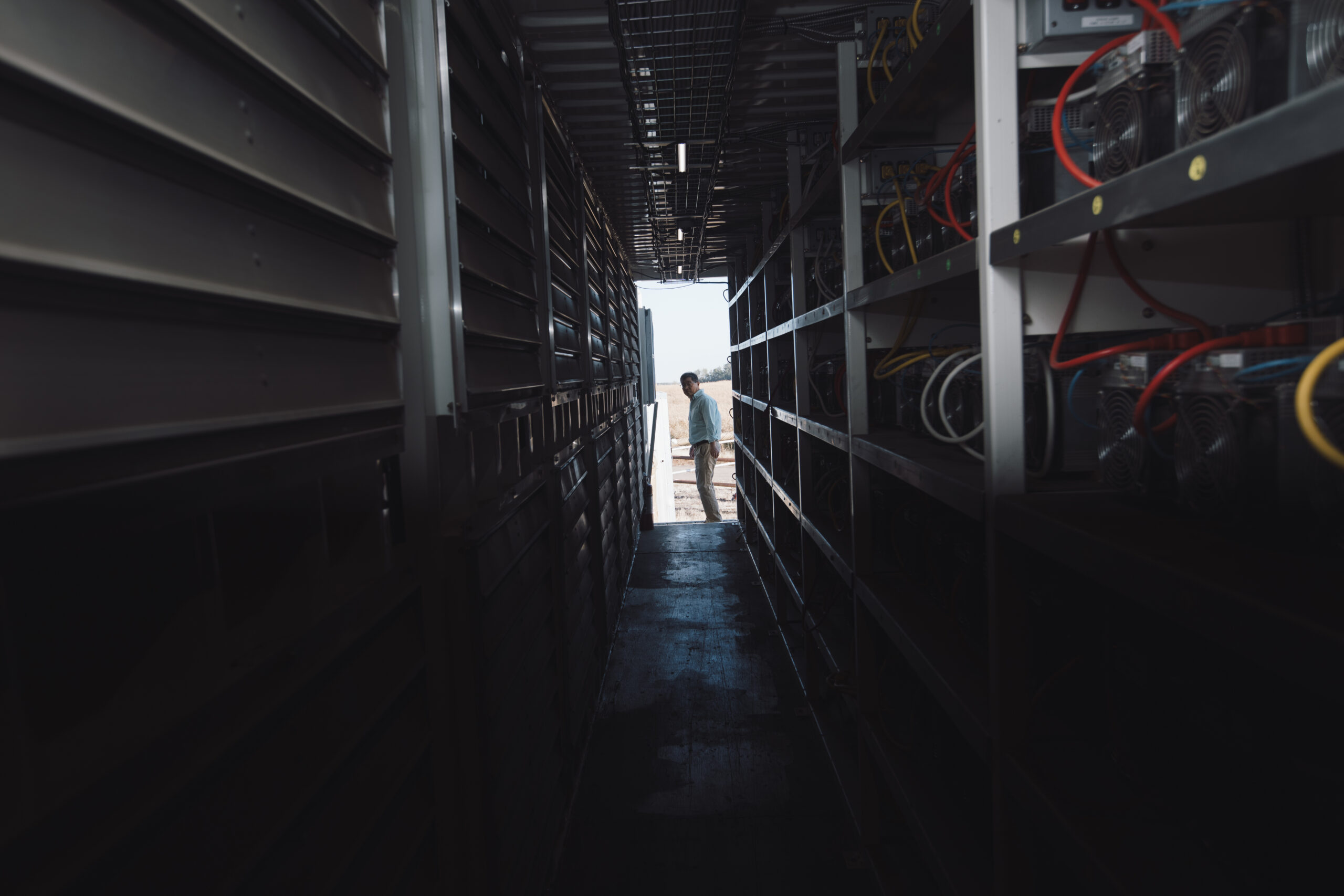
Cryptocurrencies are clearly a massive energy hog around the world. Yearly global electricity use by crypto assets now equals what is consumed by all of Australia, according to the White House, and Bitcoin accounts for about three-quarters of that.
Crypto’s emissions, meanwhile, are equivalent to that of all the world’s barges, tankers and other ships on canals and rivers, the office estimated.
The issue of energy use is in part why Ethereum, a competing cryptocurrency, recently switched its protocol to cut down on the amount of work computers needed to perform to validate its transactions.
Industry advocates suggest their activity is not necessarily at odds with climate goals. The Bitcoin Mining Council, a Texas-based group of companies including some headquartered in Canada, said that 66 per cent of the power used by its members and identified in a voluntary survey was deemed as “sustainable.”
“It is important for the world to get the real facts about the amount of energy used and carbon released by the Bitcoin Network,” co-founder Darin Feinstein said in a press release.
University of Cambridge researchers found fossil fuels account for “almost two-thirds of the total electricity mix” at 62.4 per cent, compared to 37.6 per cent for sustainable energy sources.
By mid-September 2022, they concluded, about 199.65 million tonnes of carbon pollution was attributed to the Bitcoin network.
Karringten dismissed Bitcoin mining’s dirty reputation as a leftover myth from its history of linking up with the coal power industry in China. Since that country engaged in a crackdown on crypto, miners have been “looking for the cleanest, most ethical, most renewable sources of energy,” she said.
Asked how much Canadian mining represents in terms of global crypto emissions, Karringten said she doubted if Canada would even make up a full per cent.
She also called natural gas “a very clean and very effective” source of energy for Bitcoin mining, and rejected the idea that gas-to-Bitcoin schemes were giving the fossil fuel industry a new lease on life.
“This is not extending the life of oil and gas. This is a benefit that could create a more positive environmental impact, if you can use the waste heat off of Bitcoin mining, and you can use that heat towards greenhouses, you can actually increase our agricultural production through that and create net-zero on sites, as opposed to stacking and flaring your gases,” she said.
“You can take those gases, combust them, create less damaging emissions and then use that waste heat for good.”
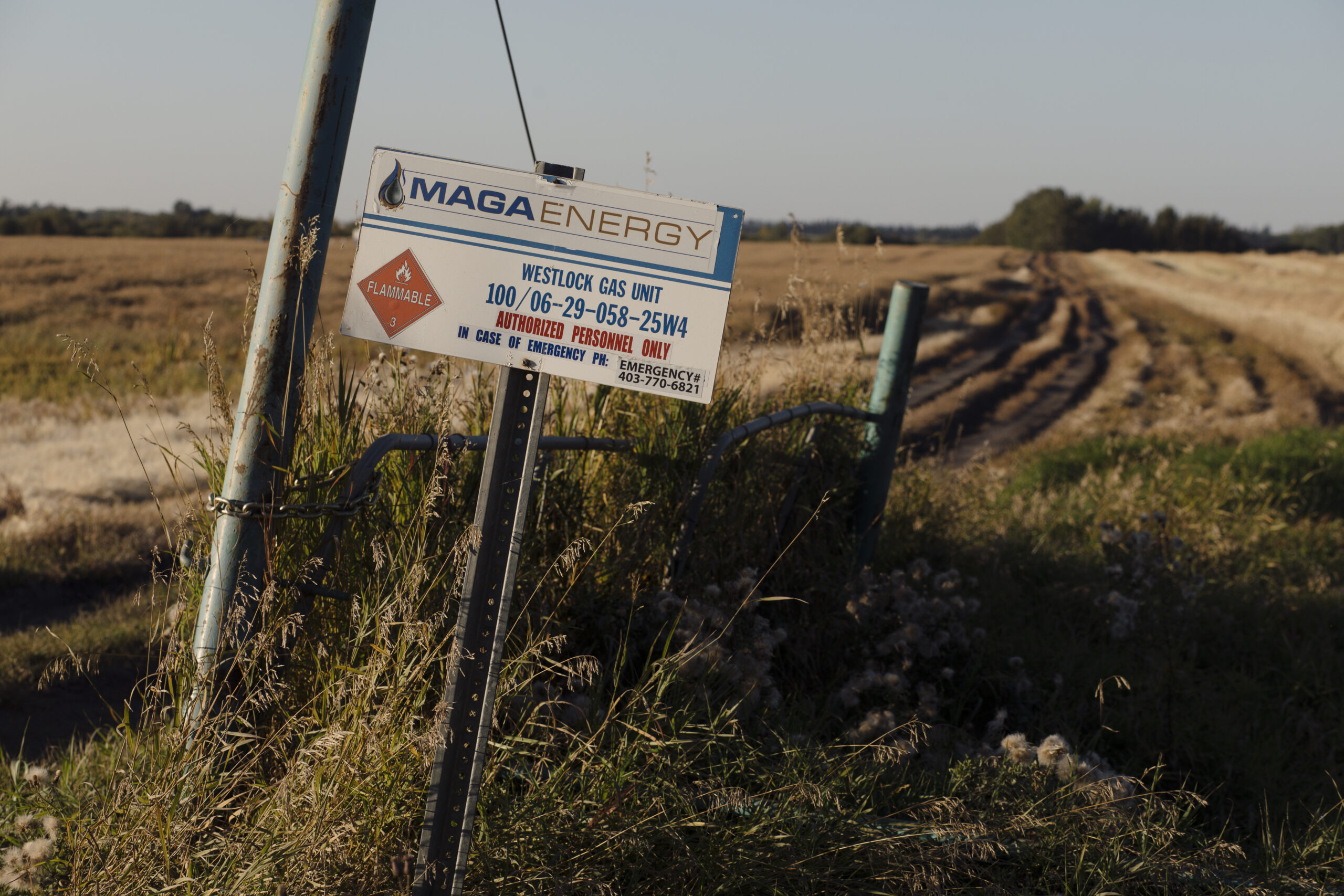
Although Tian has talked about reducing greenhouse gas emissions from the company’s projects by using carbon-capture technology, he also expressed skepticism about whether these types of initiatives were needed — raising his own personal doubts about widely accepted and extensive scientific evidence concluding humans have been responsible for global warming.
Tian said he is a geologist with a master’s degree. His name does not appear in the member directories for the professional geoscientist associations of B.C., Alberta or Saskatchewan. He declined to give more information about his professional credentials.
He said he believed people outside Alberta didn’t understand how serious average workers in the oil and gas industry treat environmental issues.
“My impression is, most people think of the oil and gas industry, ‘those people don’t fucking care about the environment.’ But we do. We do a lot,” said.
To give some examples, he talked about an experience he had 15 years ago at another oil and gas company, when he was visiting one of the company’s wells.
He said there was a spill while they were working on the well, maybe 20 or 30 litres. The supervisor at the time impressed Tian by putting down sawdust on the spill and removing the contaminated soil immediately, he said.
He said he was also amazed by how a fracking company he’d seen had made sure each joint didn’t even leave “one drop of fluid on the ground.”
In the end, Tian said he’s interested in caring for the environment for the same reason as many other people.
“We are all human beings living on this planet, and we all have to do our part to keep it in good condition,” he said.
Get the inside scoop on The Narwhal’s environment and climate reporting by signing up for our free newsletter. A $335 million funding commitment to fund...
Continue reading
In Alberta, a massive open-pit coal mine near Jasper National Park is hoping to expand...

A trade war could help remake B.C.’s food system, but will family farmers be left...

First Nations are leading efforts to make sure lake sturgeon can find a home in...
